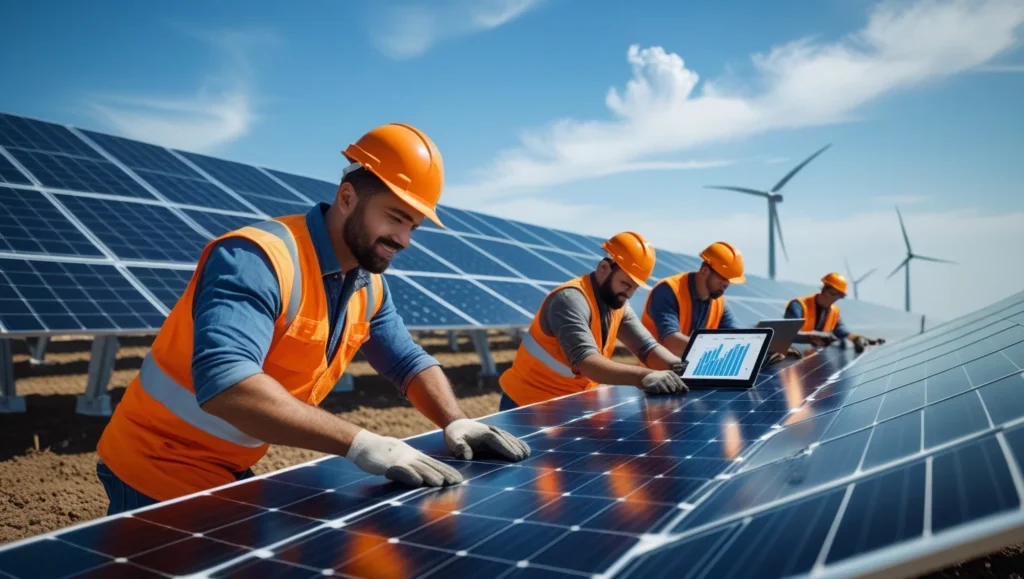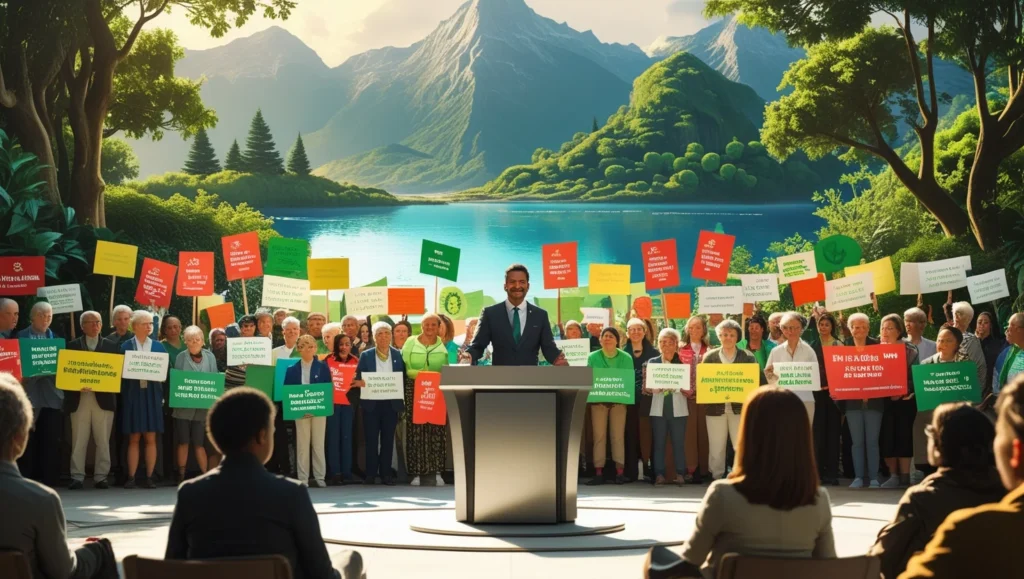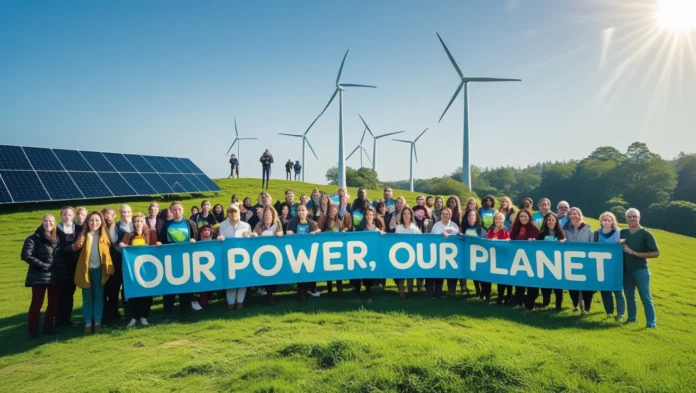Key Takeaways
- Earth Day 2025 marks the 55th year of global environmental awareness.
- “Our Power, Our Planet,” the theme for the year 2025, calls for a switch to clean, renewable energy.
- Communities worldwide are organizing hands-on events like cleanups and tree plantings.
- The focus is not just on awareness—but bold, urgent action.
- Success stories around the globe prove renewable energy is more than possible.
Introduction: The Moment Is Now
Let’s be real—climate change isn’t just a headline anymore. It’s here, and it’s personal. Earth Day 2025 lands on April 22, and this year, it’s not just about awareness. It’s about action. “Our Power, Our Planet” which is the theme for the present year serves as an inspiration. It pushes us to harness our collective energy—social, political, and literal—to drive real environmental change. And we need it more than ever.
Rising sea levels, unprecedented wildfires, record-breaking heat waves—climate change is touching every corner of the globe. The science is clear. The timeline is tight. But the good news? There is yet time for us to turn around.
Why Earth Day 2025 Feels Different
This isn’t just another Earth Day. It marks 55 years since people around the globe first stood up for the planet. Over the decades, Earth Day has grown from a grassroots protest to a massive international movement. But this year? The urgency is different. We’re not just lighting candles or posting quotes—we’re talking about a full-scale transition to renewable energy and a total transformation of how we live on Earth.
The theme—“Our Power, Our Planet”—is a double meaning. It points to the energy powering our homes and vehicles, yes—but also the energy within us. Our ability to demand better, act smarter, and push harder. The call to triple renewable energy use by 2030 may sound huge, but it’s not impossible. In fact, it’s essential.
Renewable Energy: The Real Power Move

Let’s break it down. Renewable energy is energy that comes from sources that don’t run out: the sun, wind, water, and even the Earth’s core heat. Unlike fossil fuels, renewables don’t emit carbon dioxide or pollutants that heat the planet and poison our air.
Solar panels can be installed on rooftops. Entire towns can be powered by wind turbines. Entire regions can be electrified by hydropower. Buildings can be warmed using geothermal energy, which uses the Earth’s inherent heat. These aren’t experiments—they’re proven, scalable solutions.
So why hasn’t the world made the full switch yet? Because of outdated systems, slow policy shifts, and big money behind fossil fuels. But things are changing. Tech is improving. Costs are dropping. Public demand is growing.
Global Wins: What’s Working Around the World
Let’s take inspiration from success stories. Some nations have already shown what’s possible:
- Countries with abundant geothermal or hydro resources are powering entire cities cleanly.
- Coastal regions are deploying offshore wind farms that generate massive amounts of electricity.
- Sunny areas are maximizing solar power for homes, businesses, and public infrastructure.
These examples aren’t distant dreams—they’re real, working models proving that renewable energy can scale. And more countries are joining the movement, each bringing new ideas, technologies, and momentum.
What Earth Day 2025 Looks Like in Action
This Earth Day isn’t just a moment of reflection—it’s a loud, urgent push for real-world action. Around the world, millions are rolling up their sleeves:
- Tree-planting campaigns aim to restore deforested areas and absorb carbon dioxide.
- Massive cleanup drives are removing plastic waste from rivers, beaches, and urban centers.
- Schools and universities are hosting climate literacy programs to educate the next generation.
- Local groups are organizing green fairs, renewable energy workshops, and sustainability events.
The beauty of these efforts? They’re grassroots. They’re inclusive. And they empower ordinary people to do extraordinary things.
Policy Matters: Why Advocacy Is Just as Important as Action

Individual choices matter, but systemic change is what moves the needle. The green transformation is largely driven by governments. When they back renewable energy with policies, incentives, and funding, real progress happens fast.
That’s why advocacy is a key part of Earth Day 2025. Citizens are urged to contact their representatives, attend public hearings, and support green policies. Every petition signed, every vote cast for the planet, builds the pressure needed to shift national agendas.
We’ve seen what can happen when laws change: carbon caps, renewable subsidies, bans on single-use plastics. It starts with people demanding more from their leaders.
The Hard Truth: Challenges in the Path to Change
No transition is easy. Going green means major upgrades to how we power cities, move goods, heat buildings, and grow food. It requires investment. Training. Infrastructure. Political will.
But consider the flip side: doing nothing costs more. The climate crisis is already causing billions in damages from storms, fires, droughts, and floods. Public health is suffering. Ecosystems are vanishing.
What’s more expensive—building clean energy systems or constantly cleaning up climate disasters? The math is simple. The stakes are high.
What You Can Do Today That Actually Matters
You don’t have to be a climate scientist or an elected official to make a difference. Here’s how you can show up for the planet—starting now:
- Switch energy sources: Look into green energy providers or install solar panels.
- Eat smarter: You can lessen your carbon footprint by eating less meat.
- Shop consciously: Support brands that prioritize sustainability.
- Speak up: Whether on social media or at a town hall, let your voice be heard.
- Get involved: Volunteer with local climate groups or community gardens.
It’s about progress, not perfection. Your actions, multiplied by millions, move the world.
Why “Our Power, Our Planet” Isn’t Just a Slogan
This theme hits deep. “Our Power” isn’t just electricity—it’s our influence, our voices, our choices. “Our Planet” isn’t just an idea—it’s the only home we’ve got.
The beauty of this theme is its simplicity. It reminds us that we’re not powerless. Every action, big or small, feeds into a larger momentum. Earth Day 2025 isn’t a single day—it’s the spark for something much bigger.
Conclusion: It’s Time to Turn the Corner
If there’s one message Earth Day 2025 is shouting loud and clear, it’s this: we have the tools, we have the knowledge, and we have the power. Our actions now are more important than ever. The climate clock is ticking—but it’s not too late. This Earth Day, let’s not just celebrate. Let’s commit.
Let’s take bold steps. Let’s demand action. Let’s make Earth Day 2025 the moment the world truly began to turn the corner.
Frequently Asked Questions (FAQs)
What is Earth Day 2025 all about?
It’s a call to move beyond awareness and take real, powerful steps toward clean energy and climate solutions.
What does “Our Power, Our Planet” signify as a theme?
It emphasizes both the energy we use and the influence we hold to shape the planet’s future.
How can I participate in Earth Day 2025?
Join local cleanups, attend climate events, plant trees, or simply make more sustainable choices.
Why is renewable energy so important now?
Because it’s the most effective way to reduce greenhouse gas emissions and build a sustainable future.
Can one person really make a difference?
Yes. Every small action adds up. When millions act, it creates unstoppable momentum.


